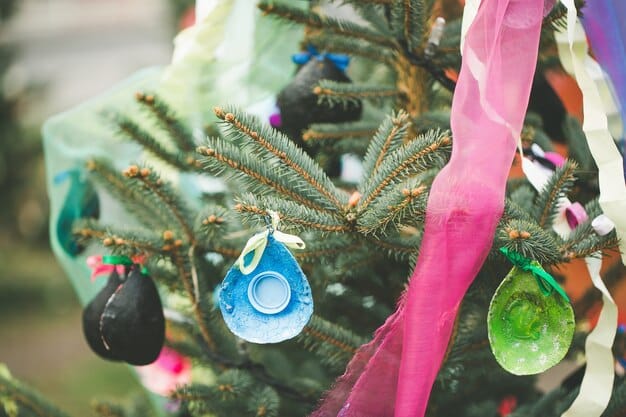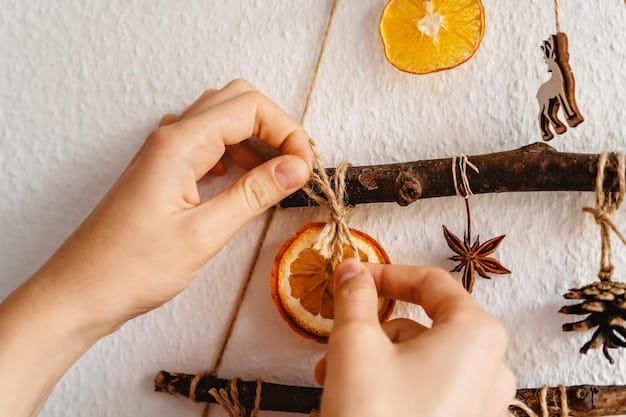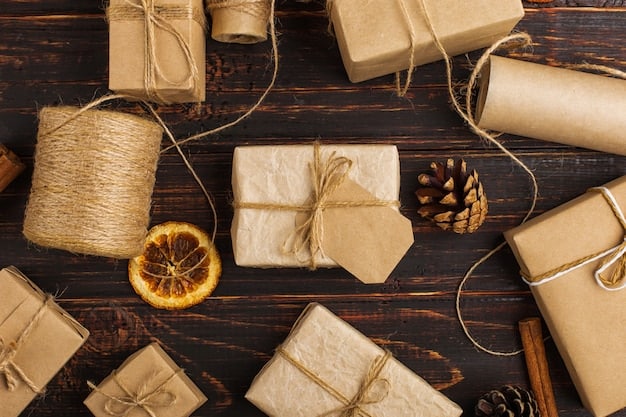Eco-Friendly Holiday: Sustainable Gifts & Decorations for a Green Season

Sustainable holiday season involves eco-friendly gift-giving and using decorations made from recycled materials, promoting practices that minimize environmental impact and support a greener celebration.
The holiday season is a time for joy, celebration, and giving, but it also brings increased consumption and waste. This year, embrace a sustainable holiday season by making eco-conscious choices when it comes to gifts and decorations, ensuring your festivities are both merry and environmentally responsible.
Embrace a Sustainable Holiday Season
Creating a sustainable holiday season is about more than just buying “green” products; it’s about shifting our mindset towards mindful consumption. It means making conscious choices that reduce waste, lower our carbon footprint, and support ethical practices.
Let’s explore some practical and creative ways to celebrate the holidays in a way that honors both tradition and the planet.

DIY Sustainable Decorations
One of the most rewarding ways to have a sustainable holiday is by making your own decorations. This not only reduces waste but also allows you to add a personal touch to your holiday decor.
- Natural Garlands: Create garlands using foraged materials like pinecones, acorns, and fallen leaves. String them together with twine for a rustic and eco-friendly decoration.
- Upcycled Ornaments: Transform old fabric scraps, buttons, and beads into unique ornaments. Get creative with different shapes and designs to add a personal touch to your tree.
- Dried Citrus Decorations: Dry orange, lemon, and grapefruit slices to create beautiful and fragrant ornaments. You can also add cinnamon sticks and cloves for extra holiday aroma.
These DIY decorations not only minimize waste but also turn the crafting process into a fun family activity. Plus, they bring a touch of nature into your home, creating a cozy and sustainable holiday atmosphere.
By embracing DIY decor, you reduce your reliance on mass-produced items, which often come with a significant environmental cost. Each handmade decoration carries a story and a purpose, making your holiday celebrations more meaningful.
In conclusion, DIY decorations offer a fun, creative, and sustainable way to adorn your home during the holidays, reducing waste and promoting a more eco-conscious lifestyle.
Eco-Friendly Gift Wrapping Ideas
Gift wrapping is a significant source of waste during the holidays. Traditional wrapping paper is often non-recyclable and ends up in landfills. However, there are many eco-friendly alternatives that are both beautiful and sustainable.
Sustainable Wrapping Materials
Choosing the right materials is key to eco-friendly gift wrapping. Opt for options that are reusable, recyclable, or compostable.
- Brown Paper: Simple brown paper is a versatile and eco-friendly option. It can be easily recycled or composted, and you can decorate it with stamps, natural twine, and greenery for a festive touch.
- Fabric Wraps (Furoshiki): Inspired by the Japanese art of Furoshiki, using fabric wraps is a beautiful and reusable way to present gifts. Choose organic cotton or linen fabrics in festive patterns.
- Old Maps and Newspapers: Repurpose old maps and newspapers for a unique and vintage look. These materials add character to your gifts and give them a second life.
Creative Embellishments
Add a personal touch to your eco-friendly gift wrapping with natural and sustainable embellishments.
Use twine, raffia, or hemp cord instead of plastic ribbons. These natural materials are biodegradable and add a rustic charm to your gifts.

Incorporate natural elements like sprigs of evergreen, dried flowers, or pinecones to add a festive and organic touch to your gifts. These embellishments are biodegradable and can be composted after the holidays.
By opting for sustainable wrapping materials and creative embellishments, you can reduce waste and showcase your commitment to the environment. This not only makes your gifts look beautiful but also shares a message of sustainability with your loved ones.
In summary, eco-friendly gift wrapping is an easy and impactful way to reduce waste during the holidays, promoting a more sustainable and mindful approach to gift-giving.
Thoughtful Eco-Friendly Gift Ideas
Choosing eco-friendly gifts can be a meaningful way to show your loved ones you care while also supporting a more sustainable lifestyle. There are numerous options available, ranging from sustainable products to experiences that promote environmental consciousness.
Sustainable Product Gifts
Consider gifts made from sustainable materials, such as bamboo, organic cotton, or recycled materials. These products have a lower environmental impact and support ethical manufacturing practices.
- Bamboo Kitchenware: Bamboo cutting boards, utensils, and bowls are durable, biodegradable, and stylish additions to any kitchen.
- Organic Cotton Clothing: Choose organic cotton clothing items like t-shirts, scarves, and socks. Organic cotton is grown without harmful pesticides and supports healthier ecosystems.
- Recycled Material Accessories: Look for accessories made from recycled materials, such as bags made from recycled plastic bottles or jewelry made from recycled metals.
Sustainable product gifts not only reduce waste but also encourage others to adopt more eco-friendly habits. By giving these gifts, you’re promoting a lifestyle that values environmental responsibility and ethical consumption.
Experiential Gifts
Experiential gifts offer a unique and sustainable alternative to material possessions. They create lasting memories and often have a smaller environmental footprint.
- Cooking Classes: Gift a cooking class that focuses on sustainable and plant-based recipes. This encourages healthy eating habits and reduces the environmental impact of food consumption.
- National Park Passes: Give the gift of outdoor adventure with a National Park pass. This encourages exploration of nature and supports the preservation of natural landscapes.
- Donations to Environmental Charities: Make a donation in their name to an environmental charity. This supports important conservation efforts and shows your commitment to protecting the planet.
Experiential gifts offer a thoughtful and sustainable way to show your loved ones you care, creating memories and promoting environmental consciousness.
Choosing sustainable product gifts or experiential gifts is a meaningful way to reduce waste and promote a more eco-friendly lifestyle during the holidays.
Supporting Local and Ethical Businesses
One of the best ways to ensure your holiday shopping is sustainable is by supporting local and ethical businesses. These businesses often prioritize environmental responsibility and fair labor practices.
Benefits of Local Shopping
Shopping locally reduces the carbon footprint associated with transportation and supports your local economy.
Local businesses often source their products from nearby suppliers, which reduces the need for long-distance shipping. This helps lower greenhouse gas emissions and supports regional sustainability.
When you shop locally, you’re investing in your community and helping to create jobs. This strengthens the local economy and supports the growth of sustainable businesses.
Local businesses often offer unique and handcrafted items that you won’t find in big box stores. This adds a personal touch to your gifts and supports the creativity of local artisans.
Finding Ethical Businesses
Look for businesses that prioritize fair labor practices and environmental sustainability. These businesses often have certifications or clearly stated values that reflect their commitment to social and environmental responsibility.
B Corp certification indicates that a company meets high standards of social and environmental performance, accountability, and transparency.
Fair Trade certification ensures that products are produced in a way that supports fair wages and safe working conditions for farmers and workers in developing countries.
Supporting local and ethical businesses not only reduces your environmental impact but also promotes fair labor practices and supports sustainable communities.
In support of local and ethical businesses, you contribute to a more sustainable and equitable economy, making your holiday shopping more meaningful and impactful.
Reducing Food Waste During the Holidays
The holiday season often involves large meals and gatherings, which can lead to significant food waste. Reducing food waste is a crucial aspect of a sustainable holiday season.
Planning and Preparation
Careful planning and preparation can help minimize food waste during holiday meals.
Create a meal plan and estimate how much food you’ll need based on the number of guests. Avoid overbuying and stick to your plan to prevent excess food from going to waste.
Prepare only what you need and store leftovers properly to extend their shelf life. Use airtight containers to keep food fresh and prevent spoilage.
Ask your guests to bring their own containers for leftovers. This encourages them to take home extra food and reduces the amount that ends up in the trash.
Creative Ways to Use Leftovers
Transform leftovers into new and delicious meals. Get creative with repurposing ingredients and minimizing waste.
- Turkey Soup: Use leftover turkey to make a hearty and flavorful soup. Add vegetables, herbs, and broth for a comforting and nutritious meal.
- Cranberry Sauce Muffins: Incorporate leftover cranberry sauce into muffins for a sweet and tangy treat. This adds a unique flavor and reduces food waste.
- Vegetable Frittata: Use leftover roasted vegetables to make a frittata. This is a versatile and delicious way to use up leftover veggies and create a new meal.
Composting food scraps is an effective way to reduce waste and enrich your garden soil.
By planning your meals, using leftovers creatively, and composting food scraps, you can significantly reduce food waste and promote a more sustainable holiday season.
Embracing these practices not only reduces your environmental impact but also teaches others about the importance of responsible food consumption.
Energy-Efficient Holiday Lighting
Holiday lighting can consume a significant amount of energy. Switching to energy-efficient options and using them responsibly can help reduce your carbon footprint. LED lights are a sustainable alternative to traditional incandescent lights.
Benefits of LED Lights
LED lights consume up to 75% less energy and last much longer than traditional incandescent lights. This reduces energy consumption and saves money on your electricity bill.
LED lights produce very little heat, which reduces the risk of fire hazards. They are also more durable and less likely to break than traditional lights.
LED lights are available in a variety of colors and styles, allowing you can still create festive and beautiful displays without harming the environment.
Responsible Lighting Practices
Use timers to automatically turn off your holiday lights when they’re not needed. This reduces energy consumption and extends the lifespan of your lights.
Solar-powered lights are a sustainable option for outdoor decorations. They rely on renewable energy and don’t require electricity from the grid.
Inspect your holiday lights annually for damage. Replace any broken or frayed lights to prevent energy waste and ensure safety.
Switching to energy-efficient lighting and using responsible lighting practices can significantly reduce your holiday energy consumption and promote a more sustainable celebration.
These small changes can make a big impact on the environment, contributing to a greener and more sustainable holiday season for everyone.
| Key Point | Brief Description |
|---|---|
| 🎁 Eco-Friendly Gifts | Choose sustainable and ethical gifts made from recycled or renewable materials. |
| ♻️ Sustainable Wrapping | Use reusable fabrics or recycled paper for wrapping gifts to reduce waste. |
| 💡 Energy-Efficient Lights | Opt for LED lights and set timers to conserve energy during the holidays. |
| 🍎 Reduce Food Waste | Plan meals carefully and compost leftovers to minimize waste during holiday feasts. |
Frequently Asked Questions
▼
An eco-friendly gift is typically made from sustainable, recycled, or renewable materials. It also supports ethical production practices and minimizes environmental impact throughout its lifecycle.
▼
Use reusable fabric wraps (Furoshiki), recycled paper, or materials like old maps and newspapers. Decorate with natural twine and greenery instead of plastic ribbons for a sustainable touch.
▼
LED lights consume significantly less energy than traditional incandescent lights, reducing your carbon footprint and saving on electricity bills. They also last longer and are more durable.
▼
Transform leftovers into new meals like turkey soup or vegetable frittatas. Compost food scraps to enrich your garden soil. Encourage guests to take leftovers home to minimize waste.
▼
Shop locally to support your community and reduce transportation emissions. Look for certifications like B Corp and Fair Trade to ensure companies meet high standards of social and environmental performance.
Conclusion
As we approach the joyous season, let’s embrace the opportunity to make mindful choices that honor both our traditions and our planet. By adopting these sustainable practices, we can celebrate a sustainable holiday season that is not only festive and memorable but also environmentally responsible, ensuring a brighter future for generations to come.





